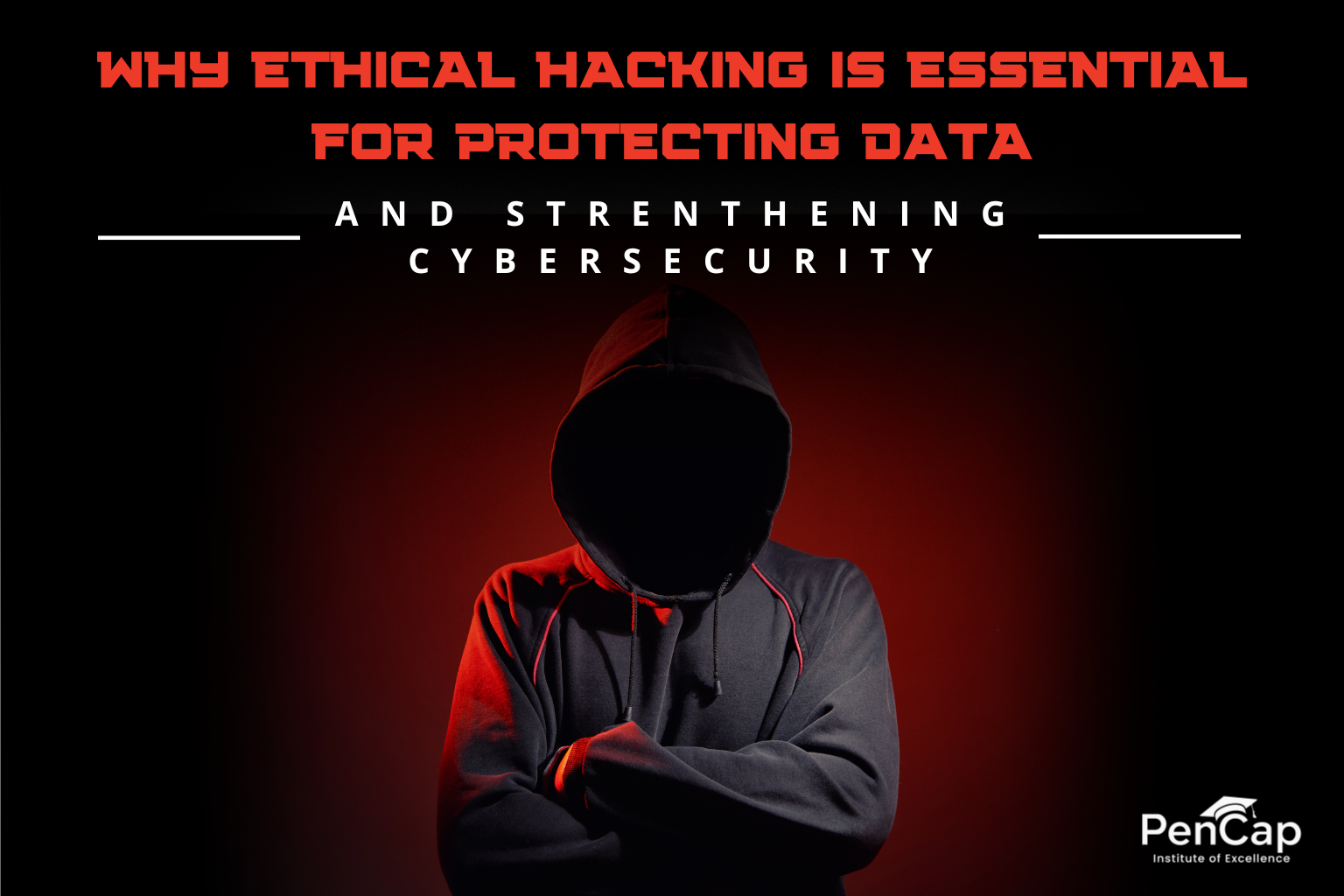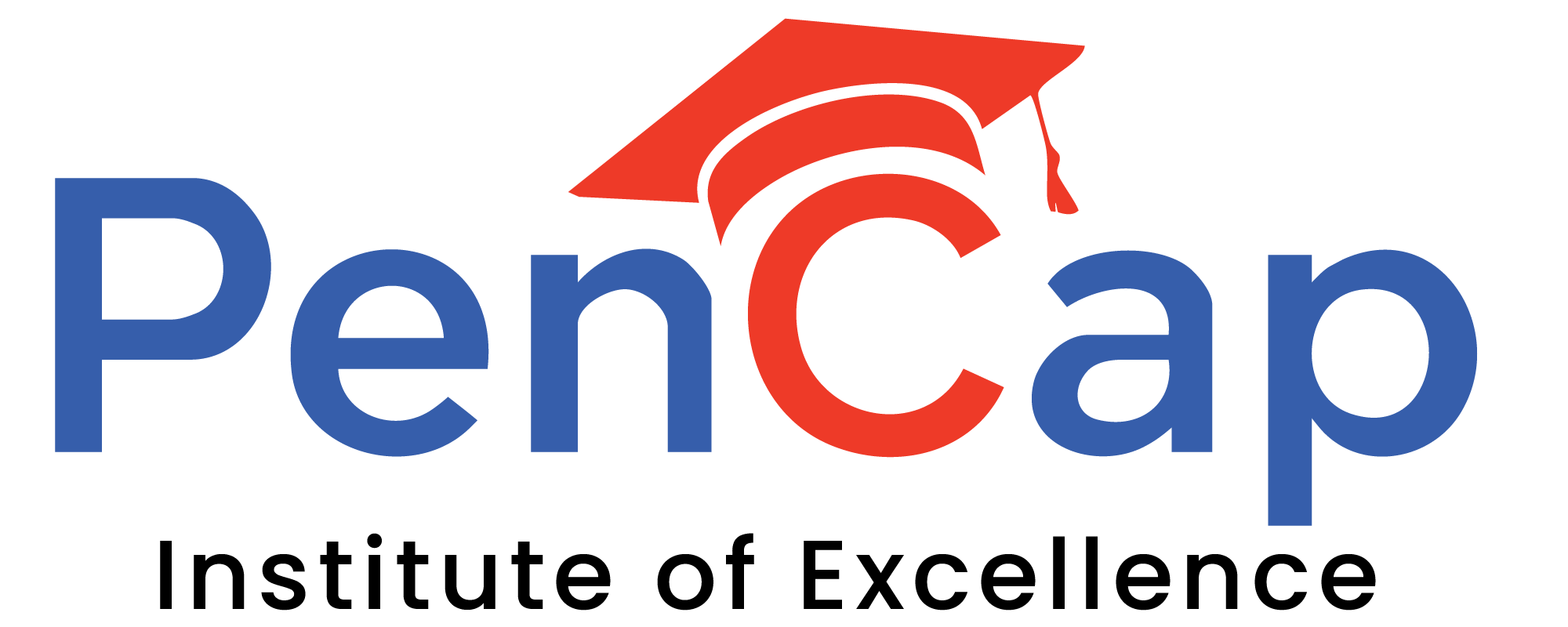
Introduction
In the modern digital era, where information is more valuable than currency, data breaches have become a daily headline. Every minute, sensitive information is stolen, sold, or compromised due to vulnerabilities in systems and networks. This is where ethical hacking in cybersecurity plays a transformative role.
Ethical hacking isn’t about breaking systems for fun it’s about securing them before criminals do. Certified ethical hackers are the silent defenders of the digital world, testing and reinforcing security systems to protect data and ensure the stability of network infrastructures.
This blog explores how ethical hacking contributes to cybersecurity, data protection, and network security, and why it’s indispensable for modern organizations in 2025 and beyond.
What Is Ethical Hacking in Cybersecurity?
Ethical hacking is the authorized practice of identifying and fixing vulnerabilities in systems, networks, and applications. Unlike malicious hackers, ethical hackers work with the consent of the organization to uncover weaknesses before attackers exploit them.
Their process mirrors that of a real cybercriminal reconnaissance, scanning, gaining access, and maintaining persistence but the goal is different: prevention, not destruction.
Ethical hackers play a key role in helping organizations strengthen their cybersecurity posture through proactive defense and continuous system improvement.
Why Ethical Hacking Matters More Than Ever in 2025
The growing digitization of every business operation means data is now the backbone of the global economy. Unfortunately, that also makes it the prime target for cybercriminals.
Here’s why ethical hacking is more crucial than ever:
- Rising Cybercrime Costs: Global cybercrime damages are projected to surpass $10 trillion annually by 2025.
- Complex Infrastructures: Cloud computing, IoT, and AI have expanded attack surfaces.
- ZeroDay Exploits: New vulnerabilities emerge faster than companies can patch them.
- Data Privacy Laws: Stringent regulations (GDPR, India’s DPDP Act) demand stronger security frameworks.
In this environment, organizations can no longer rely solely on reactive defenses ethical hacking offers a proactive solution.
Role of Ethical Hacking in Data Protection
Data is an organization’s most valuable asset, yet it’s also the most vulnerable. Ethical hackers help ensure data protection by simulating realworld cyberattacks to identify potential weak points.
How it strengthens data security:
- Detects insecure data storage and transmission methods.
- Tests encryption strength and authentication systems.
- Prevents data breaches through penetration testing.
- Identifies insider threats and misconfigurations.
By uncovering vulnerabilities before malicious actors do, ethical hackers help maintain confidentiality, integrity, and availability the three pillars of data protection.
How Ethical Hacking Supports Network Security
A strong network is the foundation of cybersecurity. Ethical hackers safeguard network security by performing deep analysis and stress testing across all connected systems.
Key Contributions:
- Firewall Evaluation: Testing firewalls for ruleset weaknesses and bypass methods.
- Wireless Network Auditing: Identifying vulnerabilities in WiFi encryption and routers.
- Intrusion Detection Testing: Assessing how well IDS/IPS systems can spot real attacks.
- Patch Management Verification: Ensuring that outdated software doesn’t become an entry point.
These assessments help prevent major cybersecurity attacks such as DDoS, maninthemiddle, or packet sniffing common methods used by hackers to infiltrate networks.
Ethical Hacking and Regulatory Compliance
Modern data privacy regulations demand that organizations maintain secure systems and report any data breaches. Ethical hacking helps businesses meet these compliance requirements by regularly testing and documenting their security posture.
Examples of Compliance Frameworks:
- GDPR (General Data Protection Regulation) Requires protection of EU citizens’ data.
- DPDP Act (India) Mandates digital accountability and user data protection.
- ISO 27001 Sets global standards for information security management systems.
- PCI DSS Ensures secure handling of financial transactions.
Regular ethical hacking audits not only prevent data leaks but also protect organizations from fines and reputational loss.
Types of Ethical Hacking in Cybersecurity
- Web Application Hacking Identifying vulnerabilities like SQL injection or XSS in online platforms.
- Network Hacking Testing routers, switches, and servers for weaknesses.
- Social Engineering Testing Simulating phishing or manipulation tactics to assess employee awareness.
- Wireless Hacking Checking the strength of wireless encryption and access points.
- Cloud Penetration Testing Ensuring cloud environments meet data security standards.
Each category plays a vital role in the broader umbrella of cybersecurity and data protection.
Benefits of Implementing Ethical Hacking in Organizations
- Proactive Risk Mitigation: Detect issues before real attackers can exploit them.
- Enhanced Security Awareness: Educates teams about modern attack patterns.
- Reduced Downtime: Prevents system outages caused by successful breaches.
- Trust and Credibility: Builds consumer confidence in data safety.
- Stronger Business Continuity: Ensures rapid recovery after incidents.
Ultimately, ethical hacking helps businesses stay resilient in a constantly changing cyber landscape.
The Future of Ethical Hacking in Cybersecurity
By 2025, ethical hacking will be heavily integrated with AI, automation, and predictive analytics. Machine learning algorithms will assist in scanning vast systems for anomalies faster than humans can.
Emerging trends include:
- AIAssisted Penetration Testing Automated scans detecting complex patterns.
- Bug Bounty Platforms Crowdsourcing global ethical hackers to find vulnerabilities.
- QuantumReady Encryption Testing Preparing for the next phase of data protection.
- Continuous Security Monitoring (CSM) Realtime vulnerability detection.
These advancements ensure that ethical hacking remains at the heart of network security and cybersecurity defense strategies.
How to Start a Career in Ethical Hacking
If you’re inspired by this field, building a cybersecurity career in ethical hacking starts with the right foundation.
Steps to Begin:
- Learn networking fundamentals and operating systems (Linux, Windows).
- Study cybersecurity basics, firewalls, and encryption.
- Pursue certifications like CEH (Certified Ethical Hacker), CompTIA Security+, or OSCP.
- Practice in virtual labs such as TryHackMe or Hack The Box.
- Stay updated with evolving cybersecurity trends.
The demand for ethical hackers is skyrocketing, and it’s one of the most rewarding professions in the digital space.
Conclusion
Ethical hacking is no longer optional it’s essential. In a world where cyber threats evolve daily, organizations must think like hackers to outsmart them. Ethical hacking in cybersecurity is the bridge between vulnerability and vigilance, ensuring robust data protection and network security.
By continuously testing and improving digital defenses, ethical hackers don’t just prevent breaches they build trust, compliance, and resilience in a datadriven world.
The next generation of cybersecurity belongs to those who defend, not destroy and ethical hacking is the key to that defense.
FAQs
1. What is ethical hacking in cybersecurity? It’s the authorized process of finding and fixing vulnerabilities before malicious hackers exploit them.
2. How does ethical hacking help data protection? It detects weak spots in data handling, encryption, and storage to prevent breaches.
3. Is ethical hacking legal? Yes, as long as it’s conducted with permission and within defined scope.
4. What are the benefits of ethical hacking? Prevents cyberattacks, ensures compliance, and strengthens overall security.
5. How does it relate to network security? Ethical hackers test networks for loopholes that attackers might exploit.
6. What certifications help start a career in ethical hacking? CEH, OSCP, and CompTIA Security+ are globally recognized credentials.
7. Can ethical hacking prevent ransomware attacks? Yes, by identifying system vulnerabilities and improving patch management.
8. How often should companies conduct penetration tests? At least twice a year or after major system updates.
9. Does AI impact ethical hacking? AI enhances detection, automates scans, and identifies threats faster.
10. Why is ethical hacking important for businesses? It ensures longterm data protection, compliance, and trustworthiness.








